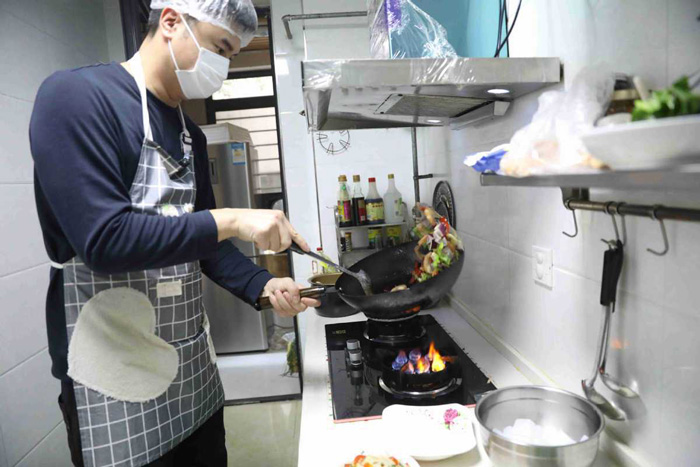
隨著生活工作節奏加快,年輕人更愿意花錢購買便利,上門服務受到了年輕一代的歡迎。從外賣、家政、收納到上門做飯、美容,上門服務市場需求大增。

Door-to-door (DTD) services have shifted from a luxury use pattern to a routine consumption mode in China.
在中國,上門服務已經從一種奢侈服務轉變為日常消費模式。
Consumers, especially the younger generation, are becoming increasingly open to ordering such services, which in turn is generating new business growth points.
消費者尤其是年輕一代越來越喜歡訂購這類服務,從而催生了新的業務增長點。
According to a report from market research company Kantar Worldpanel, China's DTD services market surpassed 2 trillion yuan ($283 billion) in 2021, growing at a compound annual growth rate of 64 percent between 2016 and 2021.
市場調研公司凱度消費者指數發布的報告顯示,2021年中國的上門服務市場超過了2萬億元,2016年到2021年的復合年增長率為64%。
"Door-to-door wardrobe organizing has experienced explosive growth since 2021. Between 2021 and 2023, the number of post-1995 consumers surged by nearly 20 percent, among which many have become our regular customers for whom we offer services every quarter," said Guo Xixi, a wardrobe organizer. "Young customers spend between 10,000 yuan and 50,000 yuan on organizing wardrobes every year.
收納師郭西西稱:“從2021年上門收納迎來井噴期至今,95后客戶數量增長了將近20%,其中一部分已經發展成為需要每個季度上門進行收納維護的長期客戶。而這些年輕客戶平均每年在收納上的花費,為1萬至5萬元不等。”
"Two years ago, our core customers were those with higher salaries. Now, demand from the middle-income group has surged."
“兩年前,核心客戶還是收入更富裕的成熟群體。但現在,許多普通收入群體對上門收納服務也有很多需求。”
Zhang Xinyuan, secretary-general of Co-found think tank, said, "With the help of the internet and smart devices, various services are delivered straight to consumers, offering a better user experience."
Co-Found智庫秘書長張新原表示,在互聯網和智能設備的幫助下,多種服務可以直達消費者,提供更好的用戶體驗。
Su Yuanyuan, a post-1995 employee in Beijing, said DTD services have brought great convenience and a sense of well-being to her life.
在北京上班的95后蘇媛媛(音譯)表示,上門服務給她的生活帶來了極大的便利和幸福感。
As an internet engineer who works from 9 am to 6 pm six days a week, spending two hours in a beauty salon was a luxury for Su, until she discovered that beauty salons had started offering door-to-door services.
作為網絡工程師,朝九晚六的工作時間和一周歇一天的休息方式,讓花兩個小時去做美容成為了奢侈,直到蘇媛媛發現美容師能夠提供上門服務。
Su now orders DTD facial care twice a month. Although she spends 30 percent more on this compared to a beauty salon, she has started to enjoy the services. Su also often makes use of DTD housekeeping and cooking services.
蘇媛媛現在每月讓美容師上門服務兩次。即使費用相對于線下服務增加了30%,她卻已經愛上了上門服務。蘇媛媛還經常購買家政服務和上門做飯服務。
"I really benefit a lot from such services. In this fast-paced society, it is such a blessing for young people," Su said.
蘇媛媛表示,這種服務讓她受益良多,在這樣快節奏的社會造福了年輕人。
Such services are also creating new occupations. Data from Qichacha, a company information aggregator, showed that currently there are 14,500 enterprises providing DTD services, covering food delivery, housekeeping, laundry, manicures, massages, repair and fresh food.
上門服務還創造了更多就業機會。企查查數據顯示,我國現存上門服務相關企業共有1.45萬家,涵蓋了外賣、家政、洗衣、美甲、按摩、維修、生鮮等各個領域。
The popularity of the sector, however, is offset by uneven service quality, lack of qualifications and inconsistent operational standards.
然而,“上門經濟”的火爆也伴隨著服務質量參差不齊、缺乏資質、運營標準不統一等行業亂象。
Meng Lilian, chief analyst at the Sichuan Tianfu Health Industry Research Institute, said: "Industry standards should be established to ensure service quality. Meanwhile, a whole-process supervision mechanism should be set up."
四川天府健康產業研究院首席專家孟立聯指出,應該建立行業標準來保證服務質量,與此同時還應該建立全程監管機制。
英文來源:中國日報
翻譯&編輯:丹妮